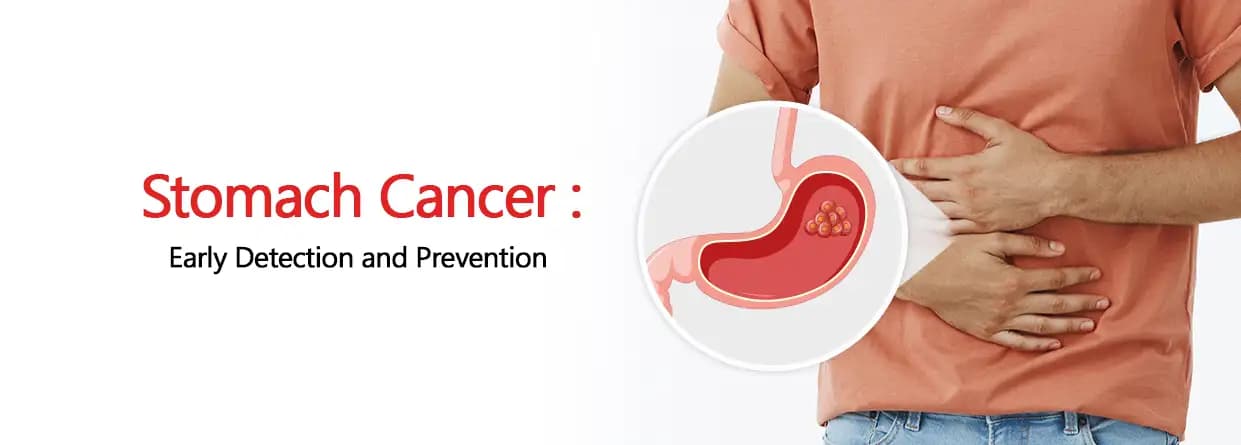
Stomach cancer also referred to as gastric cancer is one of the cancers that starts in the stomach's lining cells. As an essential component of the digestive system, the stomach breaks down food and absorbs nutrients.
Do you often brush off your persistent indigestion as a minor inconvenience? If this is the case, you should be aware that these seemingly common symptoms are the initial indications of stomach cancer, a condition that affects thousands of people annually and typically grows silently until it reaches a more severe stage. As per NCBI study, in 2020, stomach cancer accounted for almost 1.1 million new cases across the globe, ranking among the most common cancers in terms of both prevalence and fatality. Approximately 800,000 deaths were linked to the condition in the same year.
The illness is complicated and develops gradually, and its initial symptoms are often confused with less severe conditions like ulcers or acid reflux. Which is why it's so important to identify the disease's warning indicators and comprehend the risk factors.
In this blog, we will discuss stomach cancer symptoms, causes, and available treatments. It will also provide information and support for people who may be at risk or who are helping someone who is suffering from this illness. However, please note that this is research-based information and does not replace the relevance of a doctor’s consultation for more book an appointment with best oncologists in kolkata,CMRI.
Stomach cancer also referred to as gastric cancer is one of the cancers that starts in the stomach's lining cells. As an essential component of the digestive system, the stomach breaks down food and absorbs nutrients. Stomach cancer can result from abnormal cells that develop uncontrollably and create a tumour in the stomach. If not detected and treated promptly, this condition may spread to other body parts.
It's important to keep in mind that illnesses other than stomach cancer might lead to the signs of the disease. However, you must get medical attention if you or a loved one is exhibiting any of the following symptoms. In its early stages, stomach cancer symptoms might be mild, making diagnosis challenging.
Typical signs and symptoms include:
The exact cause of stomach cancer is not always known, several factors can raise one's chance of contracting the illness. Among these are:
Several complications may arise from stomach cancer, particularly if it is not treated right once. Among these difficulties are:
If symptoms don't go away, it's critical to see a doctor because early discovery is the key to successful treatment. Tests and procedures are commonly used to diagnose stomach cancer which include:
A customised treatment plan with the highest probability of success will be developed by a multidisciplinary team of experts. The course of treatment for stomach cancer is determined by the disease's stage and the general health of the patient. Typical treatment options consist of:
Although it's not always possible to avoid stomach cancer, there are things you can do to lower your risk:
Dealing with stomach cancer might be difficult, but there is hope because of recent developments in medical care. Preventive measures such as regular check-ups, eating a balanced diet, and avoiding identified risk factors can help lower the chance of contracting this illness. While fighting stomach cancer can be an emotionally and physically taxing experience, family and medical team support is crucial.
It is possible to treat stomach cancer, particularly if caught early. Radiation, chemotherapy, and surgery are available as treatments. The patient's general health and the cancer stage at diagnosis determine the prognosis, with early intervention providing the greatest results.
In rare instances, stomach cancer may run in families. The risk may be raised by certain genetic diseases such as hereditary diffuse gastric cancer (HDGC) or by a family history of gastric cancer. For those with a family history, routine testing and genetic counselling are advised.
Cancer is not directly caused by stomach ulcers. On the other hand, long-term inflammation or chronic ulcers brought on by an H. pylori infection may raise the risk of stomach cancer. This risk can be lowered by treating H. pylori infection.
Stomach cancer is not usually detected by ultrasound. Although endoscopy, CT scans, and biopsies are more useful in the diagnosis of stomach cancer, they can still be useful in evaluating the abdominal organs. To assess metastases or associated problems, ultrasound might be utilised.
Similar Oncology Blogs
Book Your Appointment TODAY
© 2024 CMRI Kolkata. All Rights Reserved.